Envision multiplying your wealth by 25 times – turning a cool $7 million into a staggering $175 million! This isn’t a fantasy. It’s the reality of William Eckhardt, a master of quantitative trading strategies. And if financial freedom is your goal and trading is your game, then it’s time to learn from Eckhardt’s ingenious methods.
To help you achieve this, I’ve handpicked 19 of the most enlightening William Eckhardt quotes from the man himself. These nuggets of wisdom reveal the secrets behind his successful trading insights. And by the end of this article, you’ll be armed with the knowledge to craft an unbeatable trading system.
So get ready to supercharge your portfolio and make more money than you ever dreamed possible!

William Eckhardt nudges traders away from the obsession of simply increasing wins or minimizing losses. This tunnel-vision approach can trigger hasty decisions, fostering a culture of fear or impulsivity. Instead, Eckhardt’s advice is a game-changer: stop obsessing over your win-loss ratio.
Because surprisingly, the win-loss ratio isn’t the golden ticket to success. On the contrary, an inflated success rate might be a red flag indicating underperformance. You might be pocketing frequent small wins, blind to the bigger, juicier opportunities that could boost your profits.
Eckhardt’s advice is a powerful wake-up call: focus on the risk-to-reward in conjunction with the win-loss ratio of your trades. This shift in perspective can be the catalyst that propels your trading success to new heights.
2. “Amateurs go broke taking large losses, professionals go broke taking small profits.”
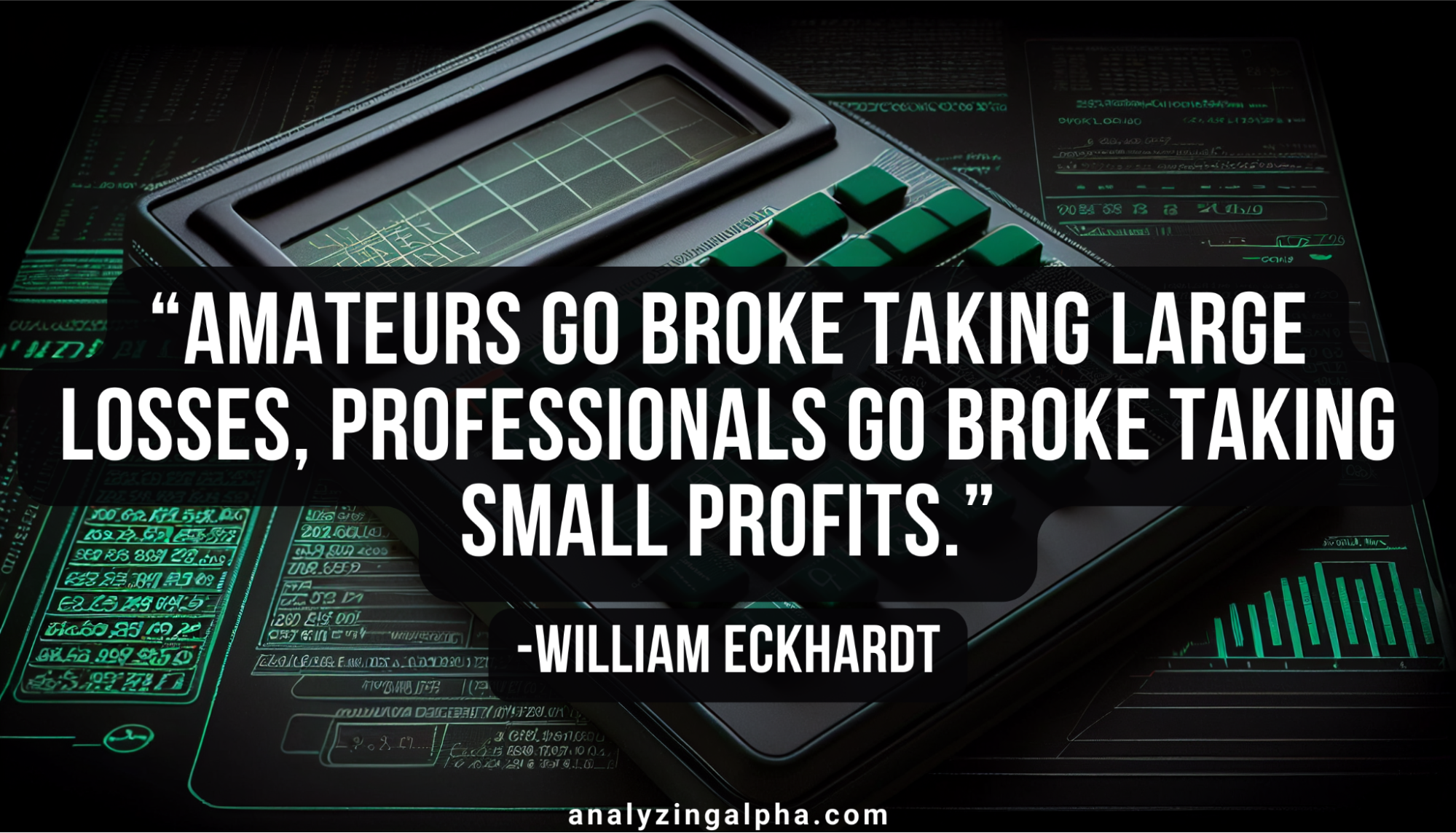
Eckhardt’s wisdom offers a deep dive into the trading universe. He hints that novices often face financial disaster by swallowing hefty losses, while seasoned traders may stumble by perpetually pocketing tiny profits.
The golden nugget for traders here? It’s all about equilibrium and playing the risk game wisely. It’s about refusing to let your losses skyrocket without prematurely trimming your profits. It’s about mastering the market’s rhythm, displaying patience, and wielding a well-crafted strategy like a sword.
This wisdom nudges us to resist the lure of fear or greed and instead make savvy decisions grounded in solid analysis. And just look at how this strategy has worked for Eckhardt! His trading powerhouse, Eckhardt Trading Company, clocked an impressive average return of 12.13% from 1991-2022. That’s a yearly outperformance of 2.65% over the index!
3. “It’s much easier to learn what you should do in trading than to do it. Good systems tend to violate normal human tendencies.”
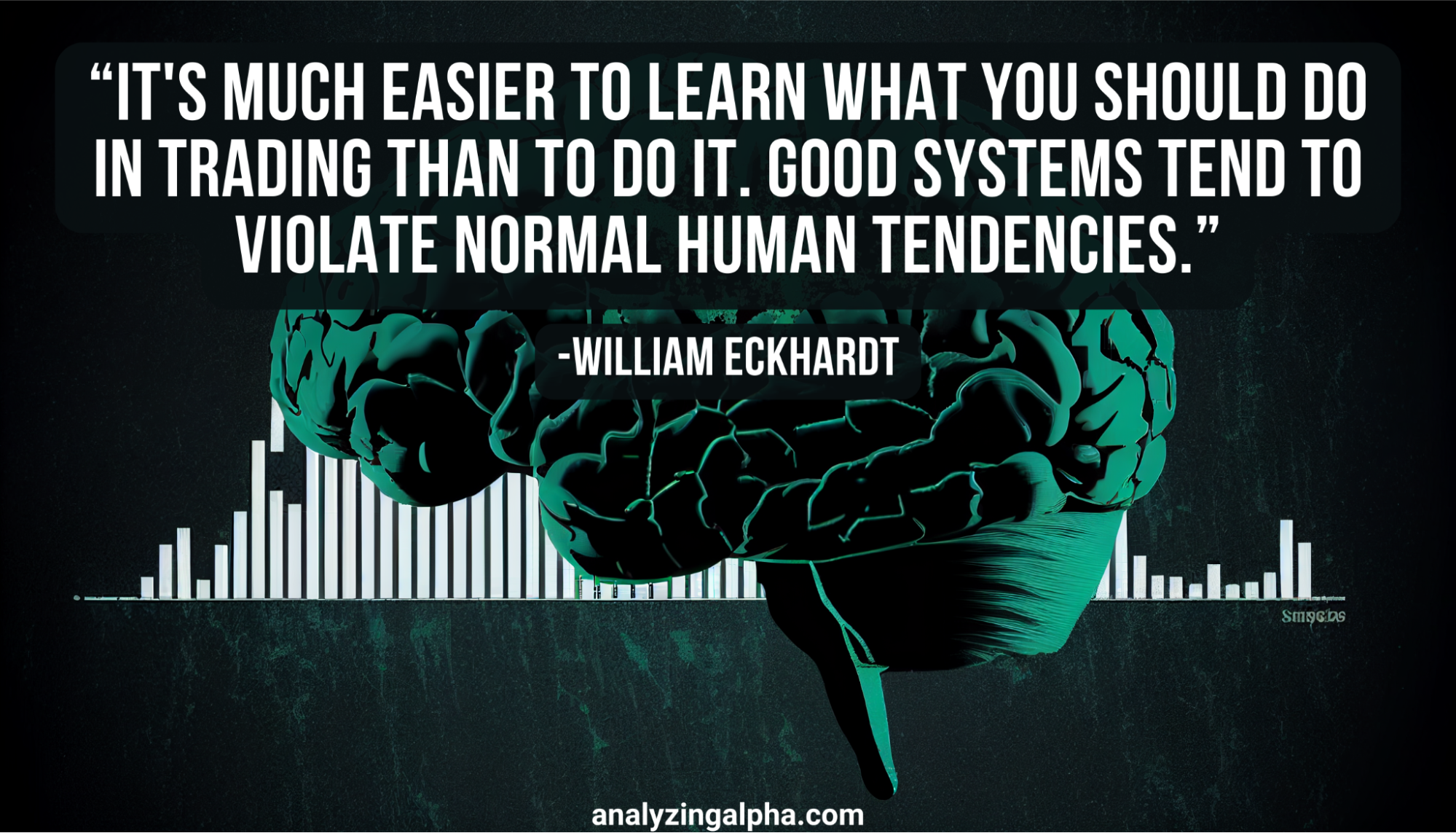
Eckhardt’s insight captures the tug-of-war between knowledge and action in the trading world. While grasping trading strategies is a cakewalk, their application is a different ball game. Why? Because successful trading systems often go against our human nature. We’re biologically programmed to dodge risk, follow the herd, and crave instant rewards – all of which are trading disasters.
Trading triumph demands an almost rebellious spirit – a readiness to embrace risk, go against the grain, and postpone immediate rewards. Eckhardt is shining a spotlight on the mental hurdles in trading. Traders need to be not just technical wizards, but also masters of their emotions, capable of taming instinctive responses. Thankfully, a robust trading system can be our ally in this!
Take, for instance, the high-stakes System 1 from Eckhardt’s legendary Turtle Trading Experiment. Here’s how it worked: for a long position, you’d buy when the current price soared above the high of the previous twenty days. For a short position, you’d do the opposite: enter when the current price dipped below the low of the past twenty days.
But if the last signal breakout resulted in a winning trade, this signal would be ignored. And the exit signal was a ten-day low for long positions or a ten-day high for short positions.
Now, that’s a system that challenges your instincts and demands courage. But remember, in the trading world, it’s the bold who strike gold!
4. “I haven’t seen much correlation between good trading and intelligence. Some outstanding traders are quite intelligent, but a few aren’t. Many outstanding intelligent people are horrible traders. Average intelligence is enough. Beyond that, emotional makeup is more important.”
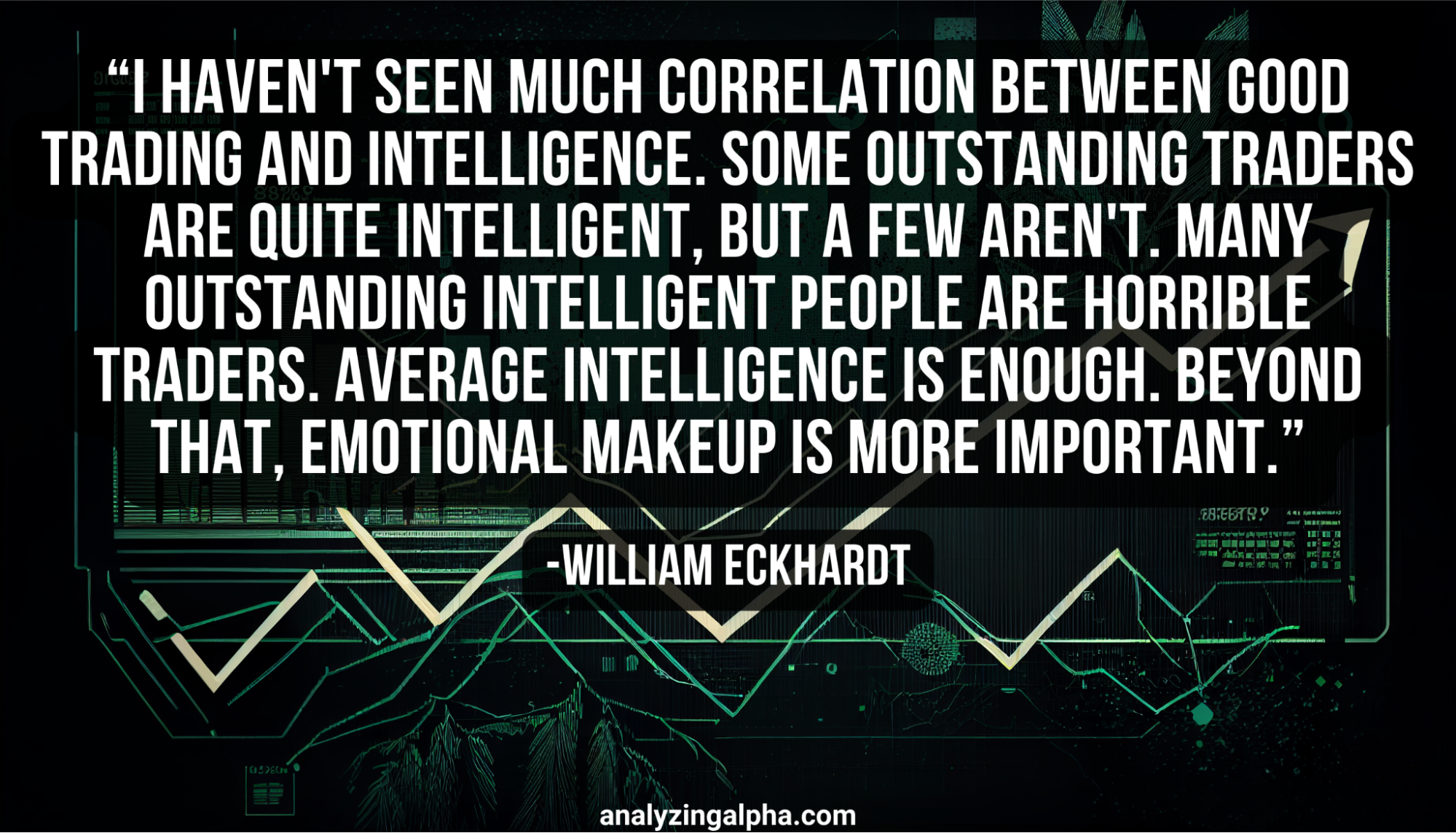
Eckhardt’s wisdom unveils another trading secret: success isn’t just for the brainiacs. Yes, some trading maestros are intellectual giants, but not all are card-carrying Mensa members. This revelation shows that ordinary intelligence can still lead to extraordinary trading victories. But wait, there’s a twist – Eckhardt asserts that emotional stability is the real game-changer in the equation.
Patience, discipline, and the ability to stay calm under pressure – these are the true power tools in trading. Numerous prodigies crash and burn in the trading arena, not due to an intelligence deficit but because they can’t control their emotional rollercoaster.
So, here’s the gem from Eckhardt’s wisdom: If you aspire to be a trading titan, don’t just flex your intellectual biceps. Instead, construct trading rules that eliminate emotion, enabling you to focus on the unyielding, uncompromising facts.
5. “What feels good is often the wrong thing to do.”
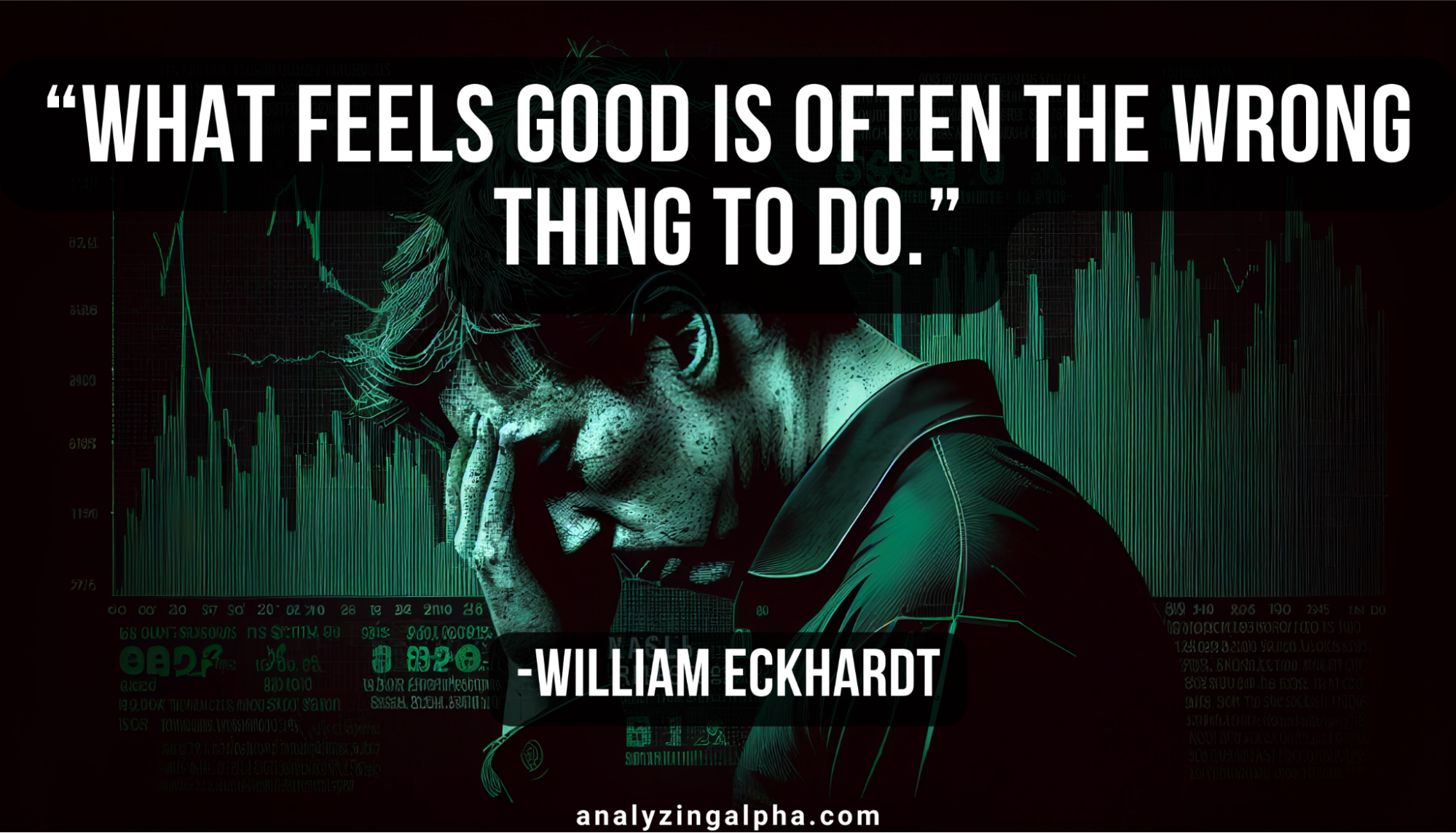
Eckhardt cautions that instant gratification can be a slippery slope to reckless trading decisions. It’s a powerful wake-up call to every trader who’s ever been seduced by their emotions or gut instincts.
Eckhardt’s advice? Ditch those knee-jerk reactions! Instead, anchor your actions in steadfast trading rules built on the bedrock of meticulous data analysis and market trend scrutiny. This method is your secret weapon to strip away emotional bias, paving the way for logical, well-informed decisions.
6. “Don’t think about what the market’s going to do; you have absolutely no control over that. Think about what you’re going to do if it gets there.”
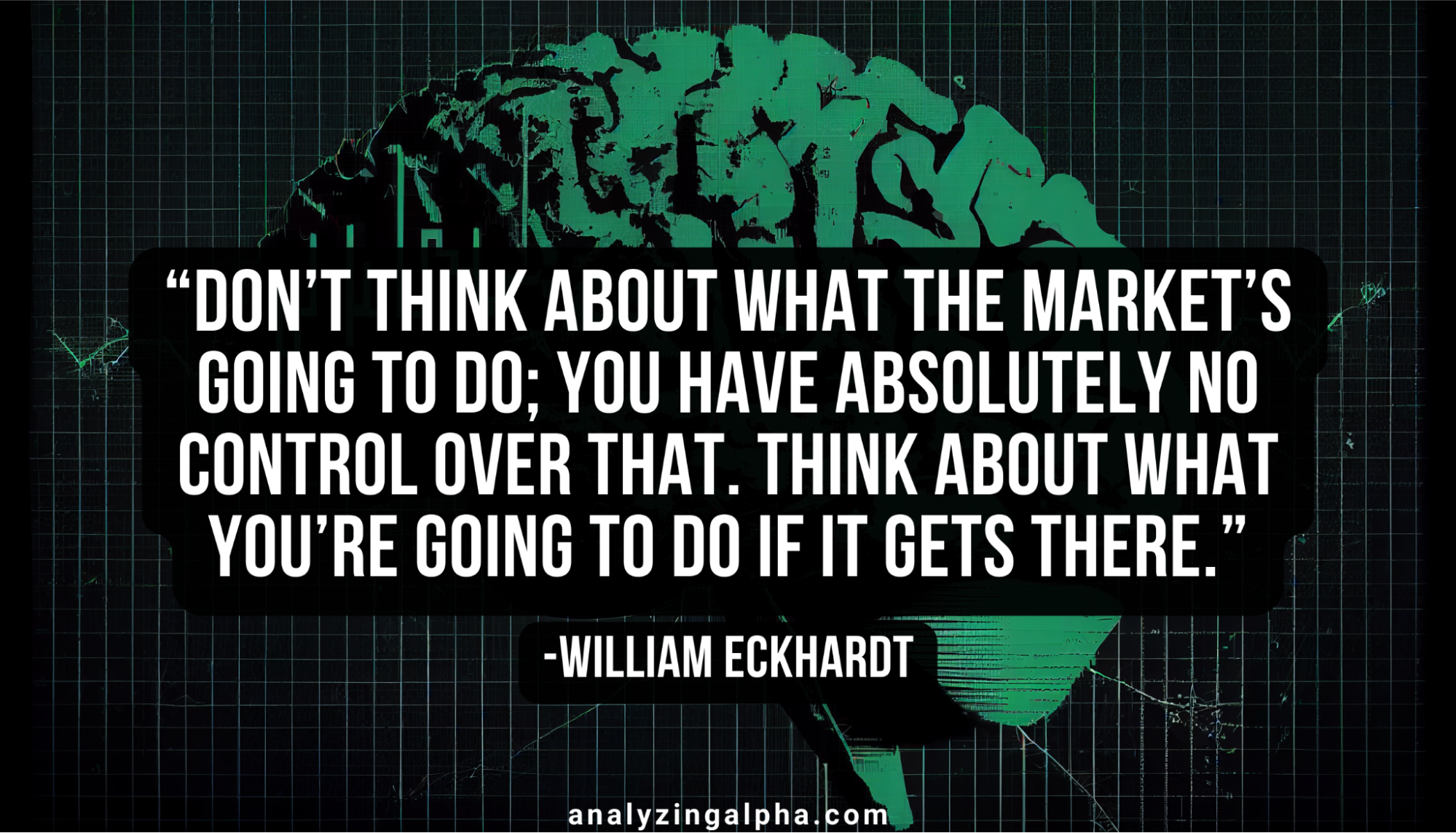
Eckhardt’s sage advice urges traders to shift their focus from the unpredictable whirlwind of market forecasts to the concrete reality of their own actions. He tells us to stop trying to predict the market’s next move, an endeavor as futile as trying to control the wind. Instead, he encourages us to focus on how we respond to the market’s ever-changing dance.
This isn’t about being reactive – it’s about being proactive. It’s about preparing for all possible market scenarios, not just the ones we hope for. It’s about developing a trading strategy as flexible as a gymnast, ready to flip, twist, and turn when presented with new information.
7. “Large profits are even more insidious than large losses in terms of emotional destabilization. I think it’s important not to be emotionally attached to large profits. I’ve certainly made some of my worst trades after long periods of winning.”
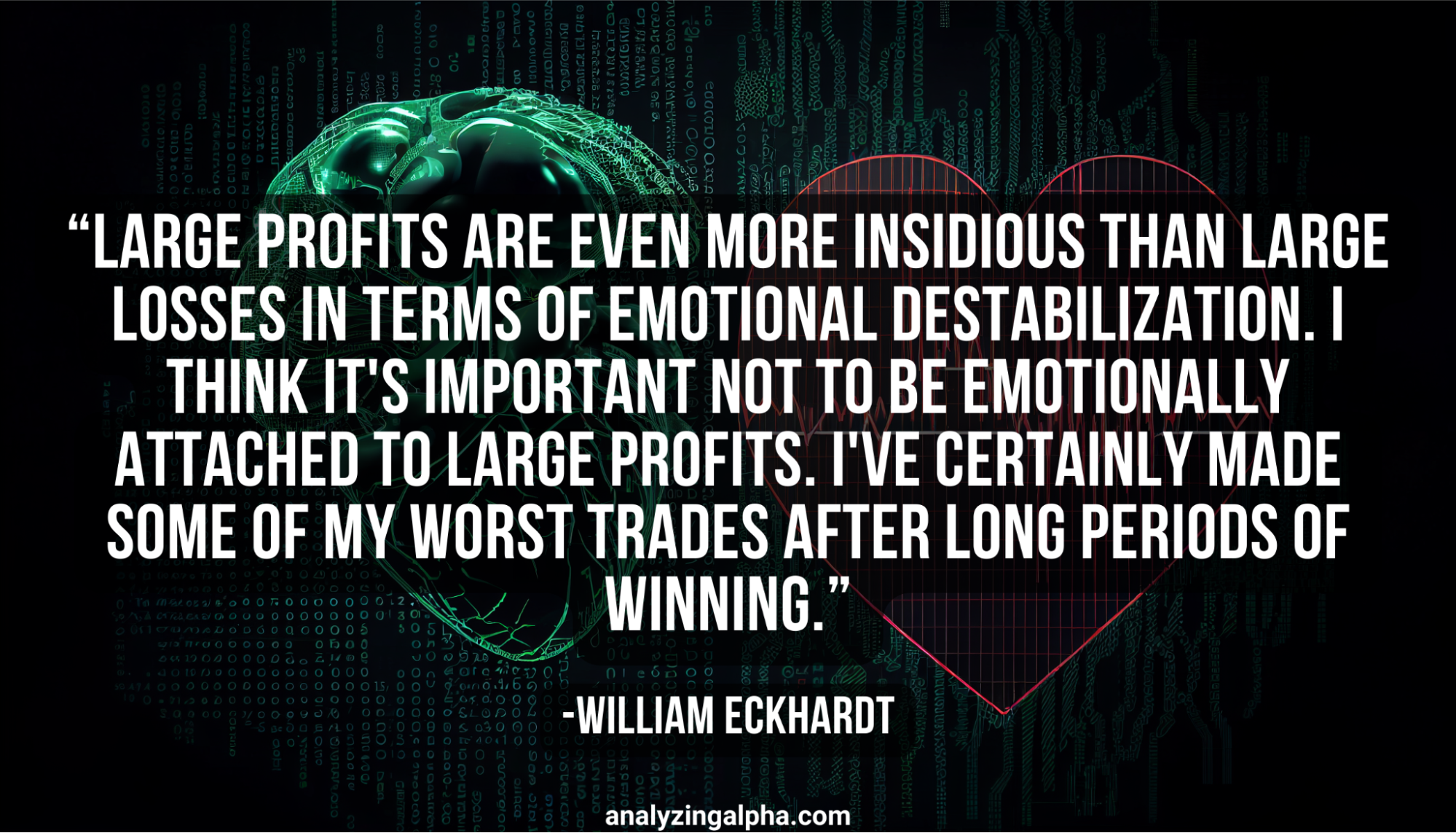
William Eckhardt cautions about the emotional whirlwind that large profits can cause. Surprisingly, they can be more mentally unsettling than hefty losses. Why? They can spark overconfidence, breed complacency, and ignite reckless behavior.
That’s why Eckhardt underscores the need to disconnect from substantial profits emotionally. Drawing from his own trading journey, he admits that his most disastrous trades followed impressive winning streaks. This reveals a hidden truth: success can cloud our judgment, leading to ill-advised decisions.
But don’t worry! Trading systems are our secret weapon in the battle against emotional decision-making. Take a peek at System 2 from the infamous Turtle Trading experiment – a strategy that’s a tad more conservative than its predecessor, System 1.
Here’s how it works. For a long position, you spring into action when the current price vaults over the high of the previous 55 days. If you’re eyeing a short position, you pounce when the price plunges below the low of the last 55 days.
Now, unlike System 1, it doesn’t matter if the previous breakout left you grinning or grimacing. Your cue to enter the market remains the same. And when to bow out? That’s when the price hits a 20-day low for long positions or skyrockets to a 20-day high for short ones.
So, let’s equip ourselves with these time-tested strategies and dive into the thrilling world of trading. Remember, in this high-stakes game, it’s not just about playing your cards right, but also playing them smart!
8. “I take the point of view that missing an important trade is a much more serious error than making a bad trade.”
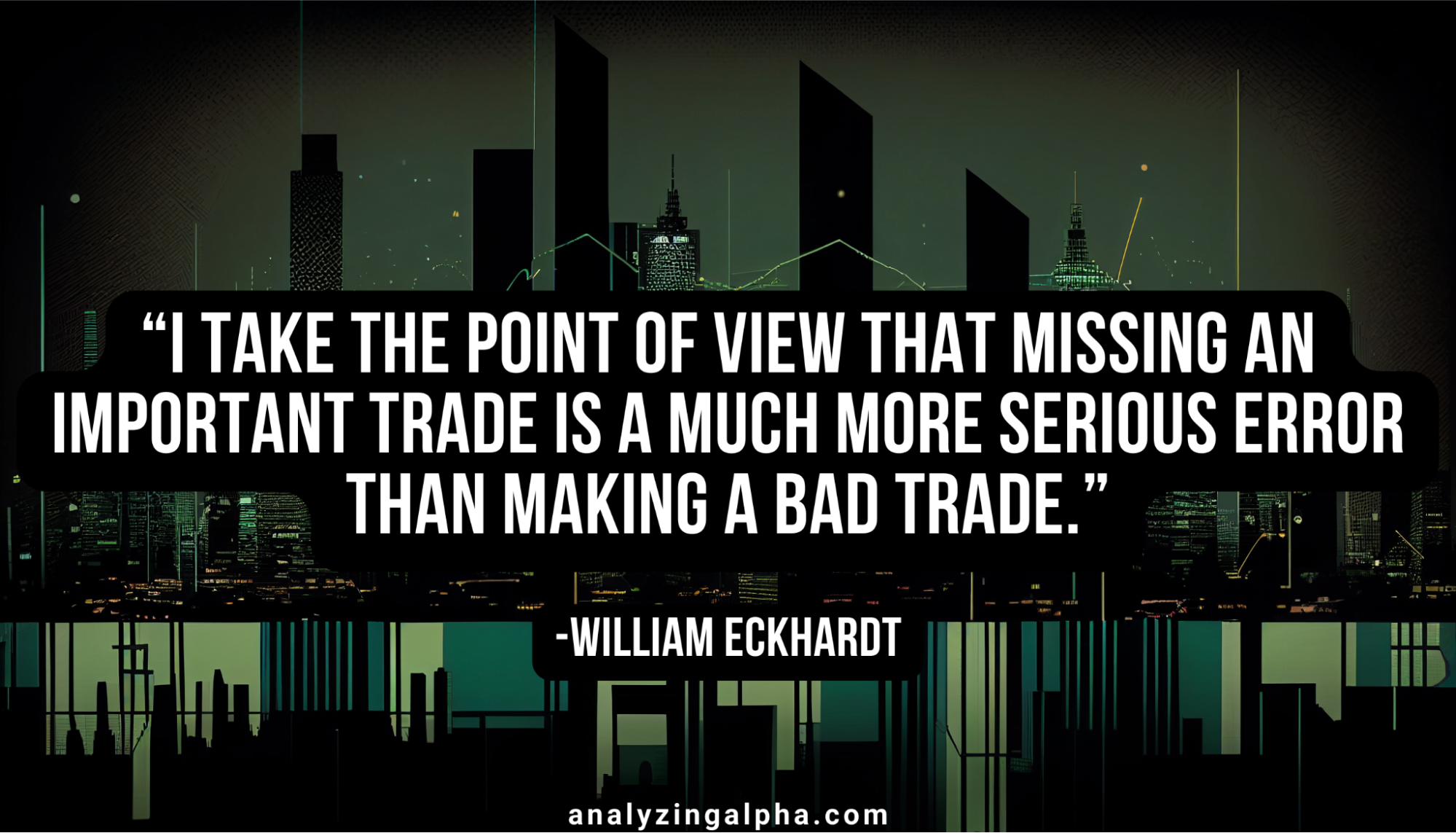
William Eckhardt accentuates the power of grabbing the bull by the horns in the trading arena. He suggests that letting a golden trade slip through your fingers due to hesitation or fear is a far worse error than making a poor trade.
Sure, a lousy trade can leave you in the red, but bypassing a winning trade? That’s an opportunity cost, a missed chance to bolster your portfolio. This insight is a wake-up call for traders: Be bold. Be decisive. Embrace calculated risks rather than shying away from trades, paralyzed by the fear of blunders.
Sometimes, the risk of sitting on the sidelines outweighs the risk of jumping into the game.
9. “I know of a few multimillionaires who started trading with inherited wealth. In each case, they lost it all because they didn’t feel the pain when they were losing. In those formative first few years of trading, they felt they could afford to lose.”
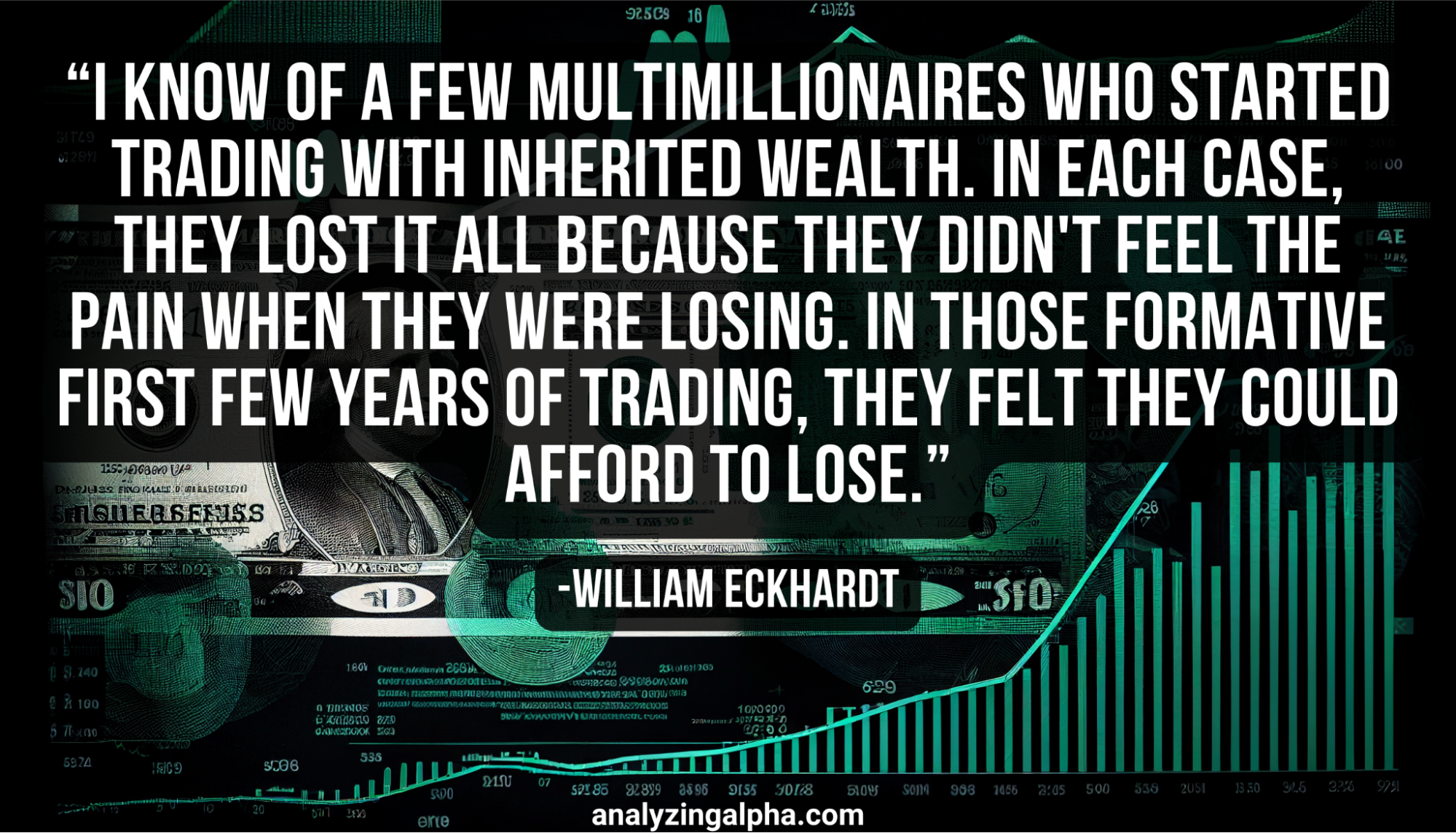
William Eckhardt underscores the critical role of financial risk awareness in trading. He shares tales of multimillionaires, born into wealth, who gambled it all away. Their cushion of inherited riches dulled the sting of loss, fostering a dangerous sense of invulnerability in their early trading years. Convinced they could afford losses, they dove headfirst into risky decisions.
This is a stark reminder to traders: understanding the worth of money and the looming threat of loss is pivotal in trading. It’s a wake-up call against complacency and a reminder that you don’t need to be rich to be a successful trader.
10. “The market likes to lull you into the false security of high success rate techniques, which often lose disastrously in the long run. The general idea is that what works most of the time is nearly the opposite of what works in the long run.”
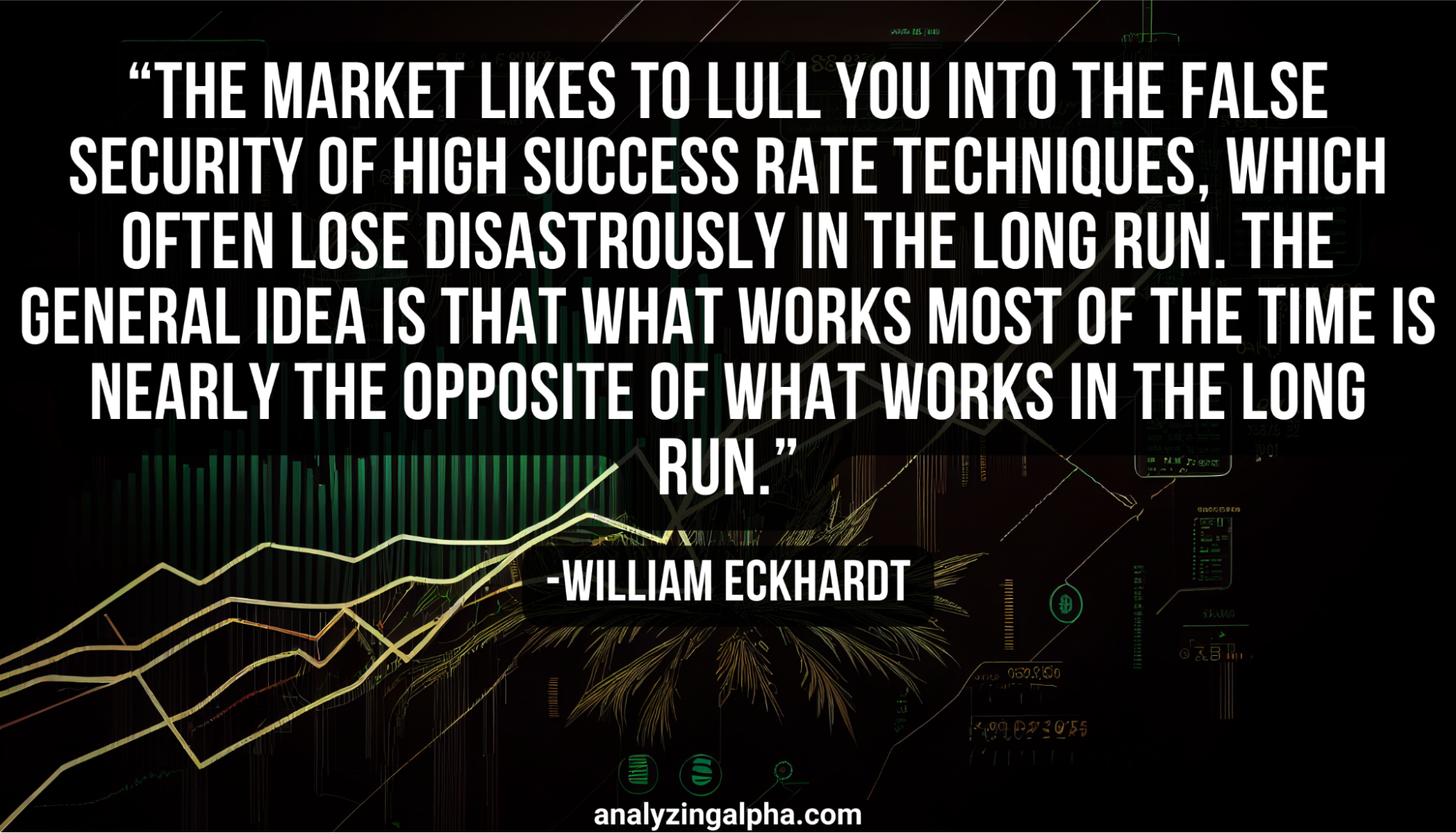
Eckhardt delivers a stark warning to traders about the market’s cunning tricks. He argues that strategies boasting high success rates in the short term often set the stage for dramatic losses in the long run. Why? Because the market’s a chameleon, constantly changing its colors. A strategy that’s a superstar today might be a dud tomorrow.
So, traders, don’t fall for the market’s siren song of quick wins. Instead, keep your eyes on the horizon. Focus on strategies that deliver consistent results over time, even if they’re not always the flashiest performers.
11. “If the losses don’t hurt, your financial survival is tenuous.”
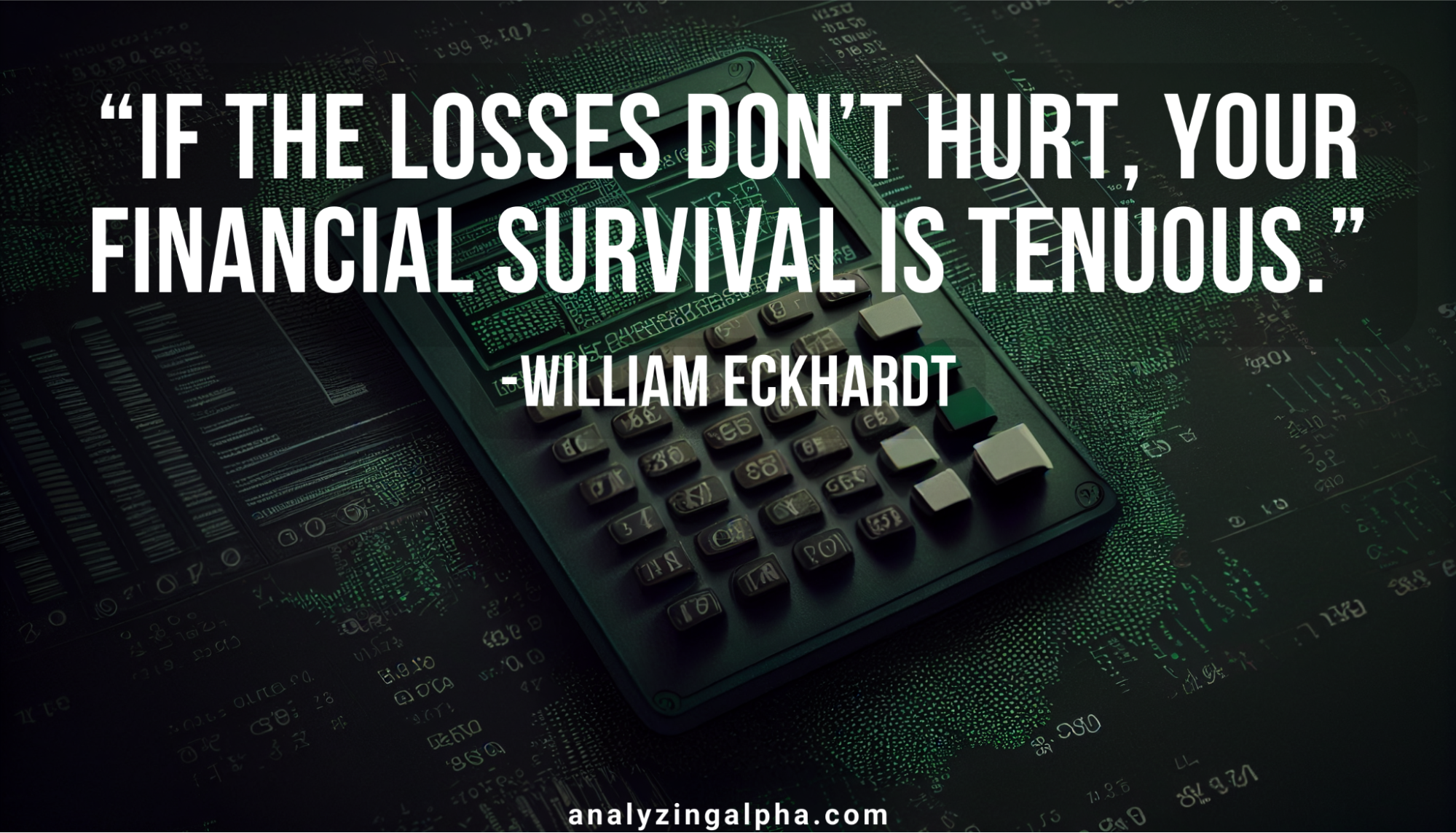
Eckhardt suggests that financial setbacks should sting enough to trigger a reevaluation of your trading tactics. If losses don’t hurt, it hints that you may not be fully committed or involved in your trading pursuits, thereby gambling with their financial security.
This nugget of wisdom nudges traders to emotionally invest in their financial maneuvers. It inspires them to perceive losses not merely as stumbling blocks but as priceless lessons to fine-tune their tactics.
Nonetheless, we must strive to minimize trading losses whenever possible. Eckhardt’s clever strategy? Portfolio diversification. He cleverly juggles multiple trading positions at once. This way, even if one stumbles, the others may leap ahead, offsetting the loss.
12. “As a general rule, losses make you strong and profits make you weak.”
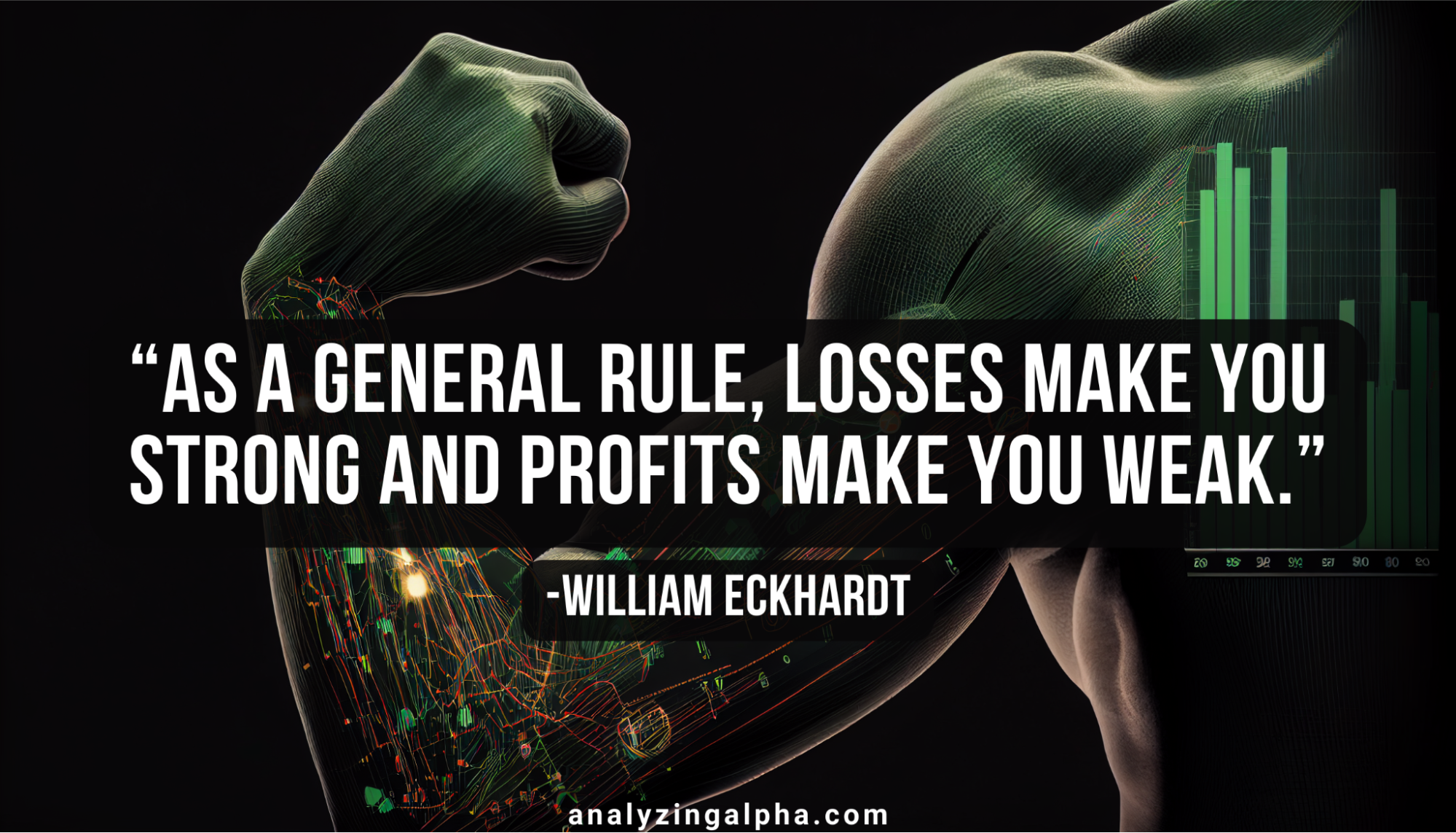
William Eckhardt suggests that the sting of trading losses can forge a path to strength, sparking resilience and fostering growth. These setbacks push traders to scrutinize their tactics, pinpoint their missteps, and sharpen their skills. In contrast, an unbroken streak of profits can breed complacency or overconfidence, leaving traders vulnerable.
Profits can be deceptive, potentially concealing unseen flaws in a trading strategy that could trigger losses down the line. Eckhardt’s wisdom implores traders to seize losses as opportunities for learning, and not to let a steady stream of profits lull them into a false sense of security.
So, traders, embrace the journey, value the lessons learned, and never let the joy of consistent profits blind you to potential areas for growth.
13. “You can be very promiscuous in your research, but not in your trading.”
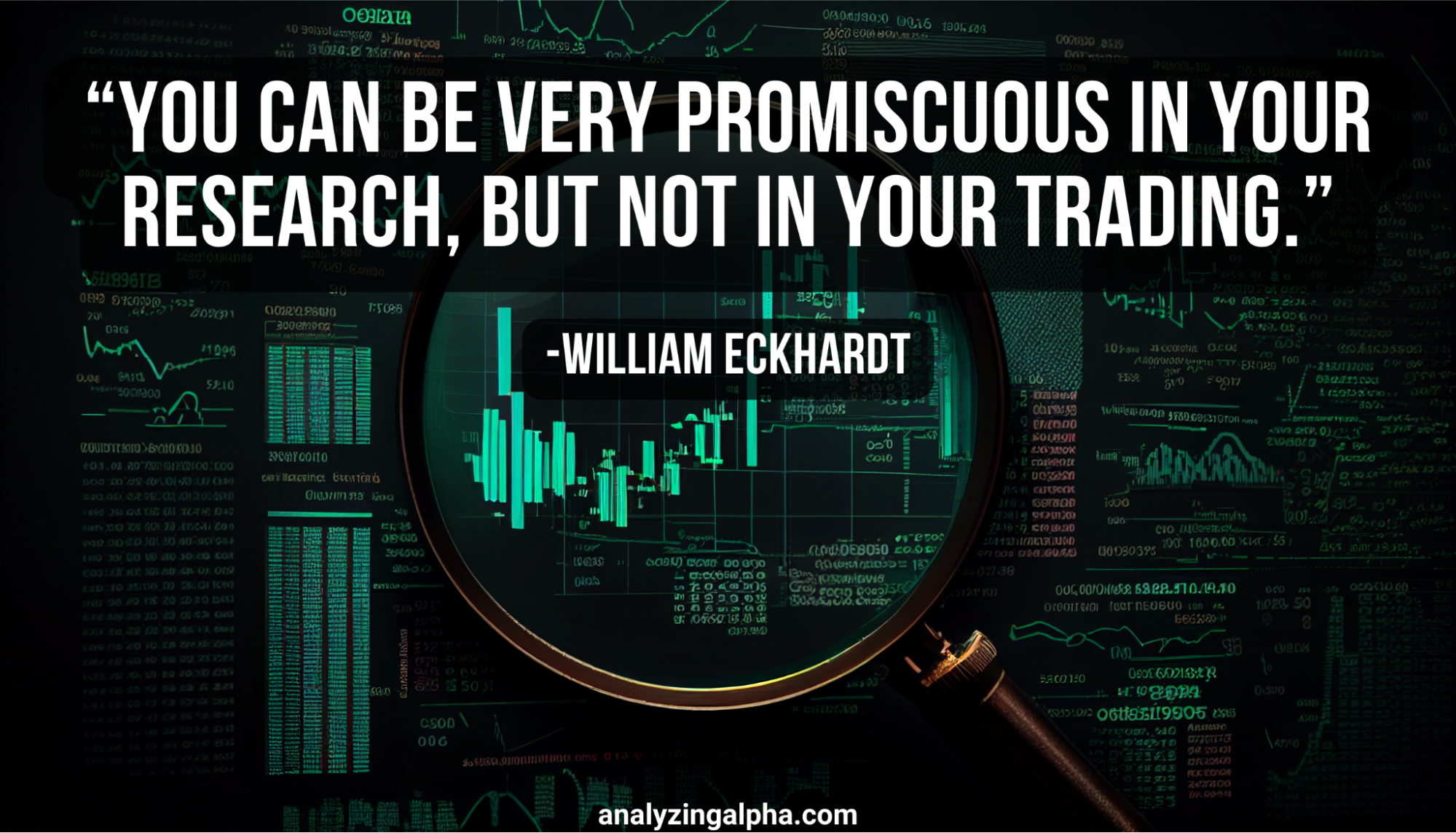
William Eckhardt urges traders to be adventurous explorers in their research, diving into a vast sea of ideas, strategies, and information. Yet, when it comes to trading, he insists on the importance of unwavering discipline. Think Indiana Jones in a library, but a Zen monk in the trading room.
Why? Because a robust trading system is like a compass in the wild. It guides you, keeps you grounded, and shields you from the whims of emotion and impulse. It’s your secret weapon for slicing through market chaos with surgical precision.
With a well-honed system, you can measure, analyze, and supercharge your performance. It’s your safety net, risk manager, and a ticket to consistent returns. So, while it’s thrilling to be a jack-of-all-trades in research, it’s vital to be a disciplined master in trading.
14. “People want to buy cheap and sell dear; this by itself makes them countertrend. But the notion of cheapness or dearness must be anchored to something. People tend to view the prices they’re used to as normal and prices removed from these levels as aberrant. This perspective leads people to trade counter to an emerging trend on the assumption that prices will eventually return to ‘normal’.”
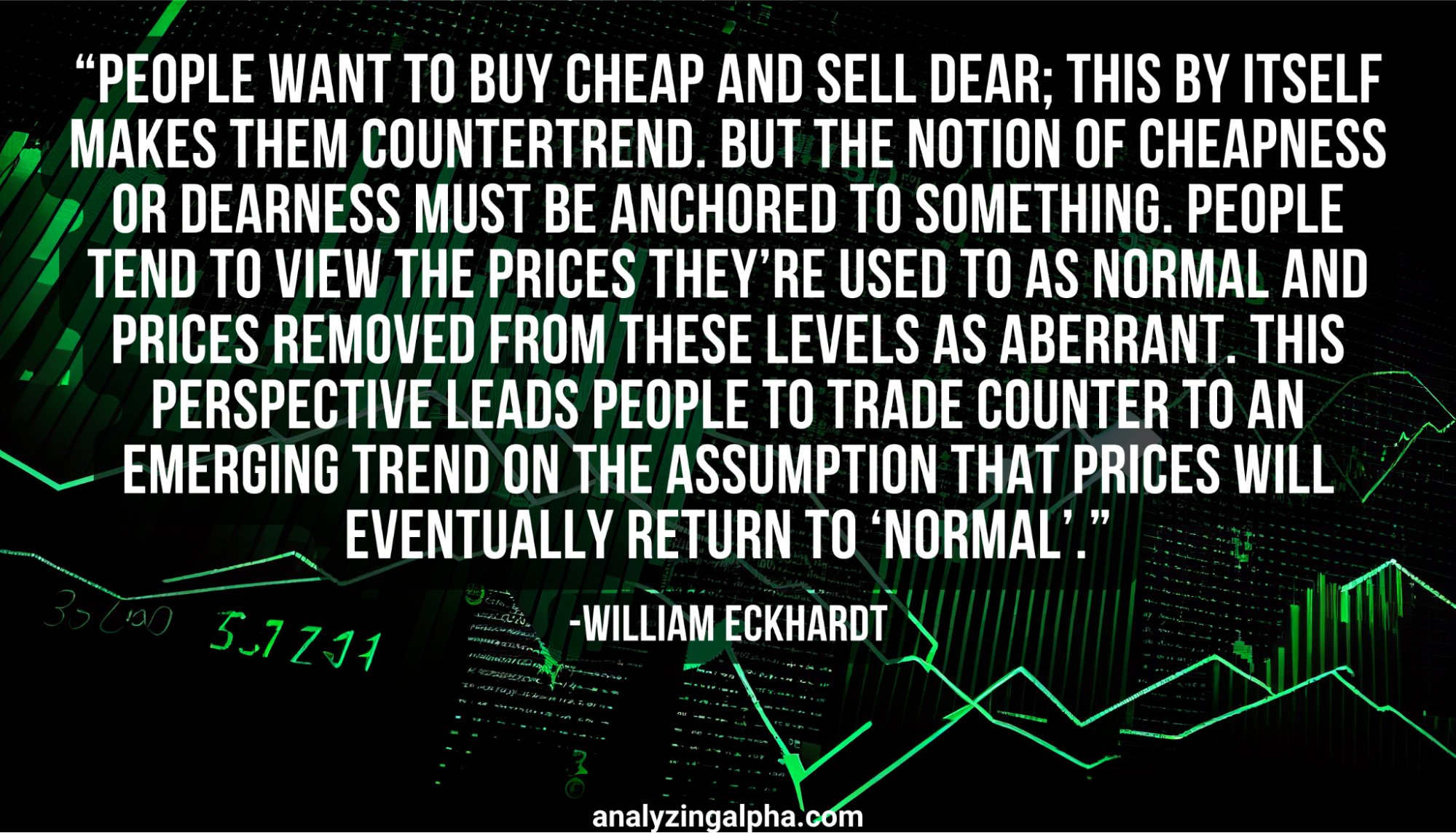
Eckhardt suggests that traders often act on their perception of ‘normal’ price levels, snapping up bargains when prices dip and cashing in when they soar. This belief in a ‘reversion to the mean’ strategy can be a risky game, as the concept of ‘normal’ is subjective and can lead to misjudged market trend predictions.
That’s why trading maestro William Eckhardt champions trend-following strategies. For him, it’s a potent weapon to tackle the wild beast of market volatility. Eckhardt is a vigilant market trend sleuth, a pattern detective, and a strategist who strikes when the iron is hot. His method eliminates guesswork and gut instincts, relying solely on the unyielding truth of data.
And this approach has clearly worked out for Eckhardt! From his humble beginnings in 1978, all the way to 1991, his account flaunted an impressive 62% annual growth! And get this – he only experienced one year of loss during this time. These numbers are a true testament to the power of identifying market trends!
15. “The people who survive avoid snowball scenarios in which bad trades cause them to become emotionally destabilized and make more bad trades. They are also able to feel the pain of losing.”
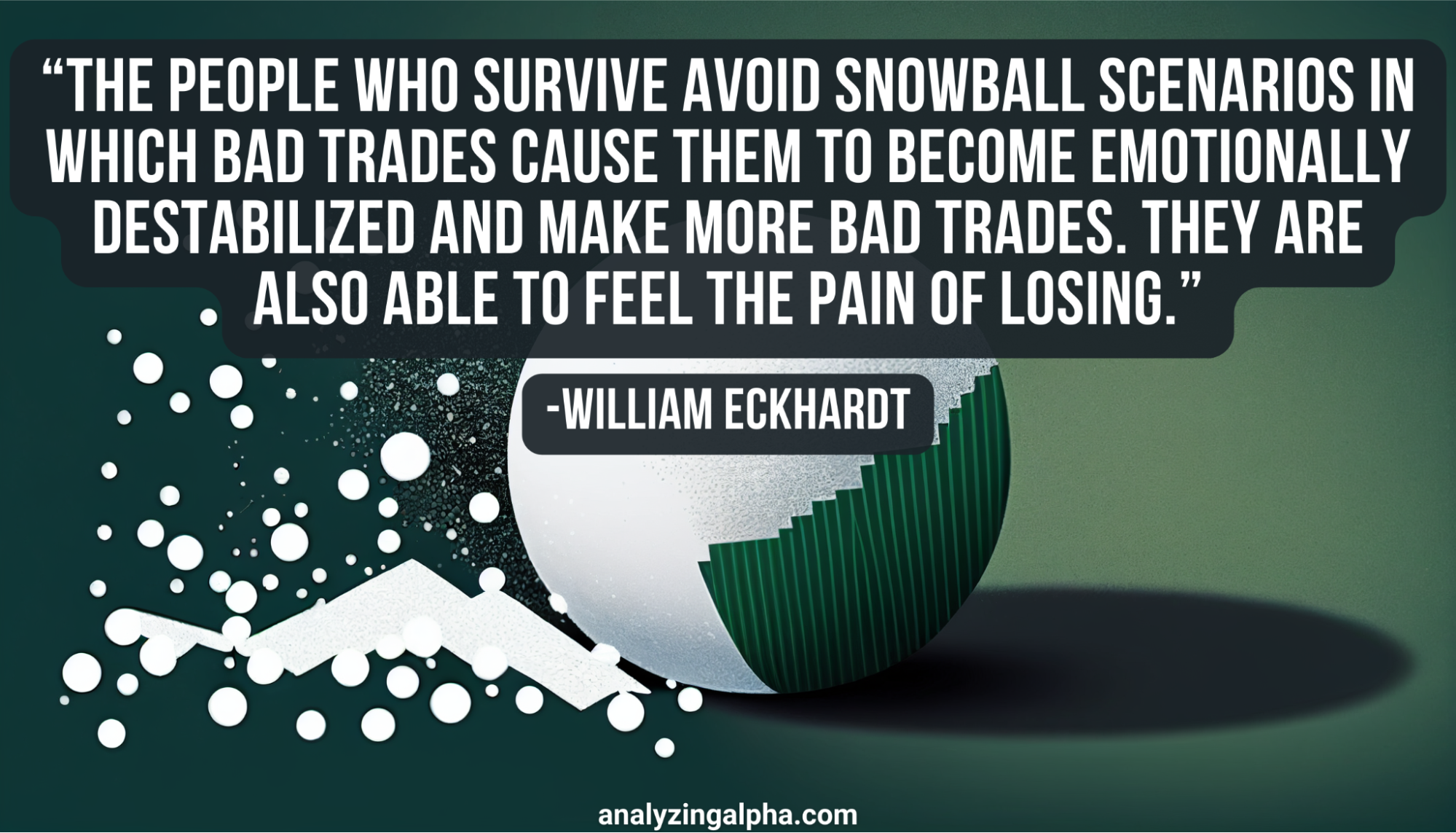
Eckhardt explains the critical role of emotional fortitude and grit in trading. He cautions against a domino effect, where one disastrous trade triggers a cascade of ill-judged decisions. This could catapult you into a whirlwind of substantial losses and shaky financial ground.
Eckhardt insists that the victors in the trading arena are those with the mental toughness to withstand losses, glean valuable lessons from them, and sidestep the trap of repeating the same mistakes. They refuse to let their emotions hijack their trading decisions. Instead, they stick to a level-headed, methodical approach, even when the going gets tough.
16. “If you don’t feel the pain of a loss, then you’re in the same position as those unfortunate people who have no pain sensors. If they leave their hand on a hot stove, it will burn off. There is no way to survive in the world without pain.”
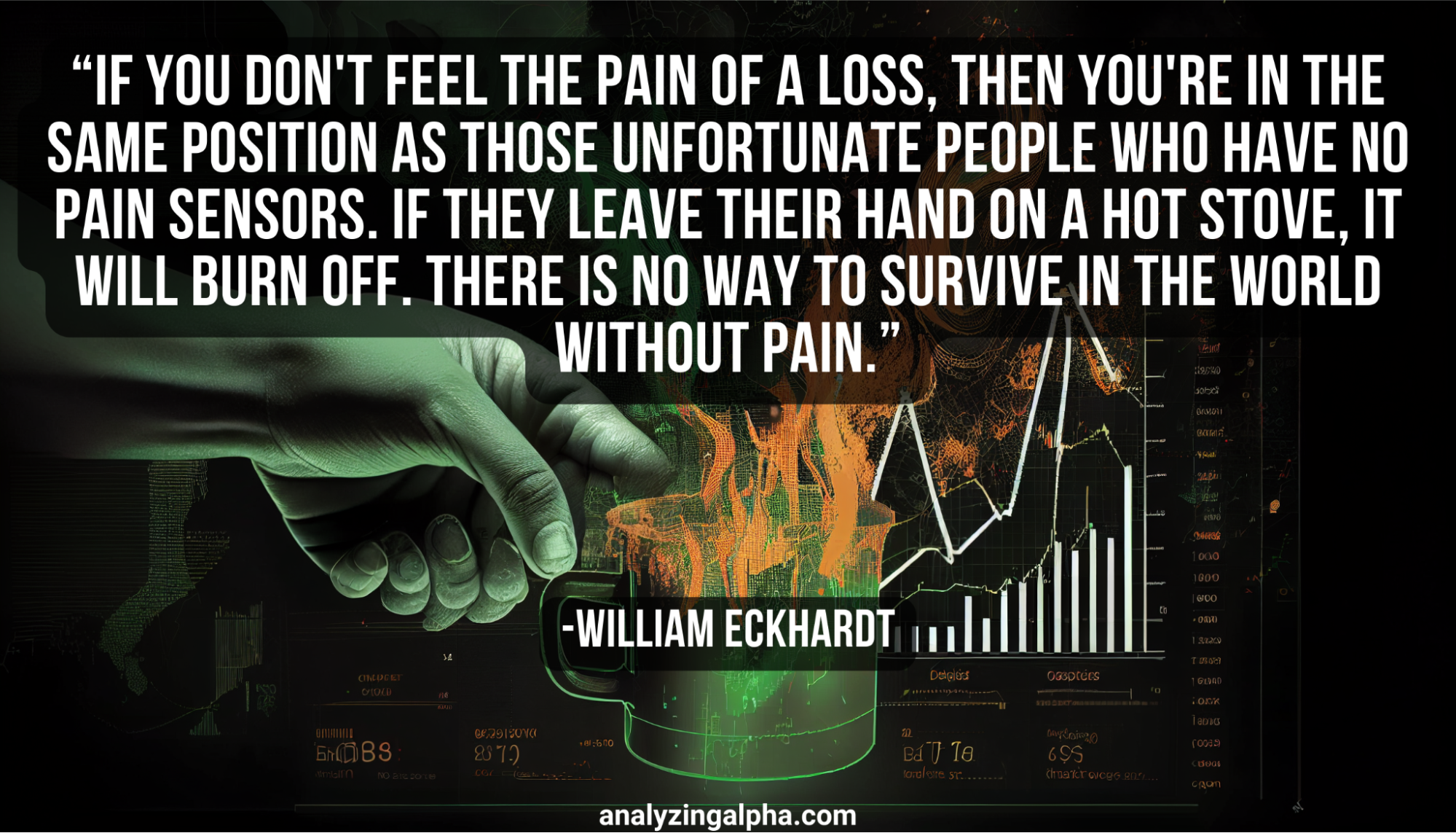
William Eckhardt reminds us of the power of taking losses. He compares traders who brush off losses to individuals without pain sensors, risking severe, unnoticed harm. He insists that embracing the sting of loss is vital for thriving in the trading arena.
After all, this pain serves as an alarm bell, guiding traders to identify and absorb lessons, shielding them from future blunders. So if your trading system flops, harness that disappointment to craft an even better one for the future!
17. “When you’re on a big winning streak, there’s a temptation to think that you’re doing something special, which will allow you to continue to propel yourself upward. You start to think that you can afford to make shoddy decisions. You can imagine what happens next.”
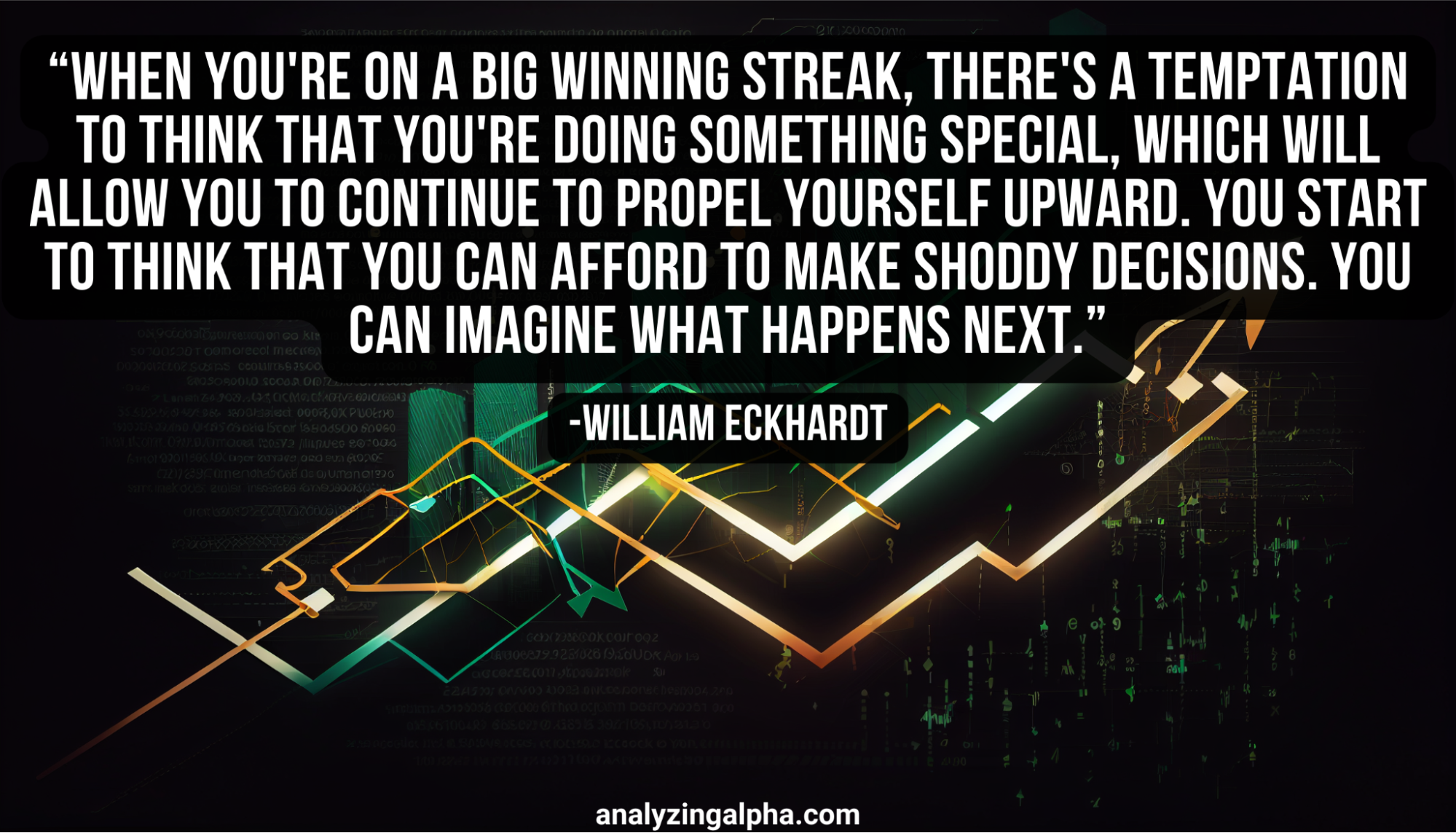
Eckhardt’s wisdom reminds traders: Beware the intoxicating allure of a winning streak. Success can sometimes breed a dangerous delusion of invincibility, leading you down a slippery slope of reckless decisions and devastating losses.
This invaluable insight is a rallying cry for traders to stay grounded, even when riding high on success. It champions the cause of data-driven decisions over brash arrogance. It underscores the vital need for discipline and objectivity in trading, regardless of the fleeting euphoria of short-term gains.
So, how can traders dodge the pitfalls of overconfidence? The answer lies in anchoring their decisions on robust analysis, not on the flimsy foundations of emotion or hubris. This approach not only safeguards against overconfidence but also ensures that traders’ strategies are rooted in solid, analytical ground.
18. “You should spend no time at all thinking about those rosy scenarios in which the market goes your way, since in those situations, there’s nothing more for you to do. Focus instead on those things you want least to happen and on what your response will be.”
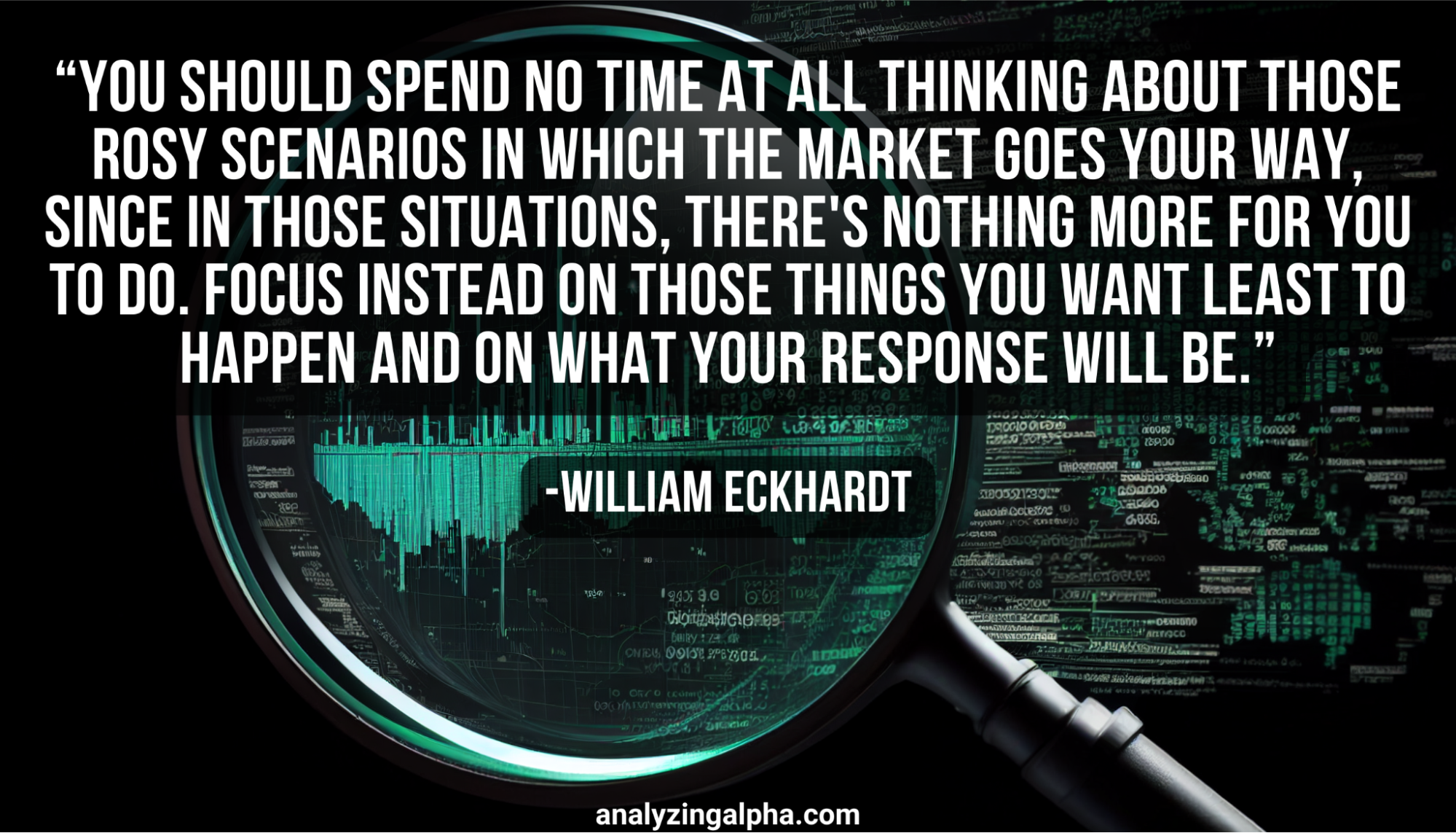
Trading titan William Eckhardt is a master at managing risk. He advises traders to forget daydreaming about perfect market conditions, as they demand no extra effort. Instead, he insists on gearing up for the unexpected downturns.
So, how does Eckhardt tame the beast of risk? First off, he swears by his golden 2% rule. It dictates that you should never gamble more than 2% of your account on a single trade. This rule is your safety net, ensuring that even if a trade goes belly-up, your portfolio remains intact!
But Eckhardt doesn’t stop there. He also advocates for a stop-loss limit. This clever strategy caps your potential losses on any given position. By placing a stop-loss order, you’re instructing your broker to sell a security when it reaches a certain price. This way, you’ll have a margin of safety even when a trade takes a nosedive.
19. “Investing is a negative game emotionally. If you’re playing for the emotional satisfaction, you’re bound to lose.”
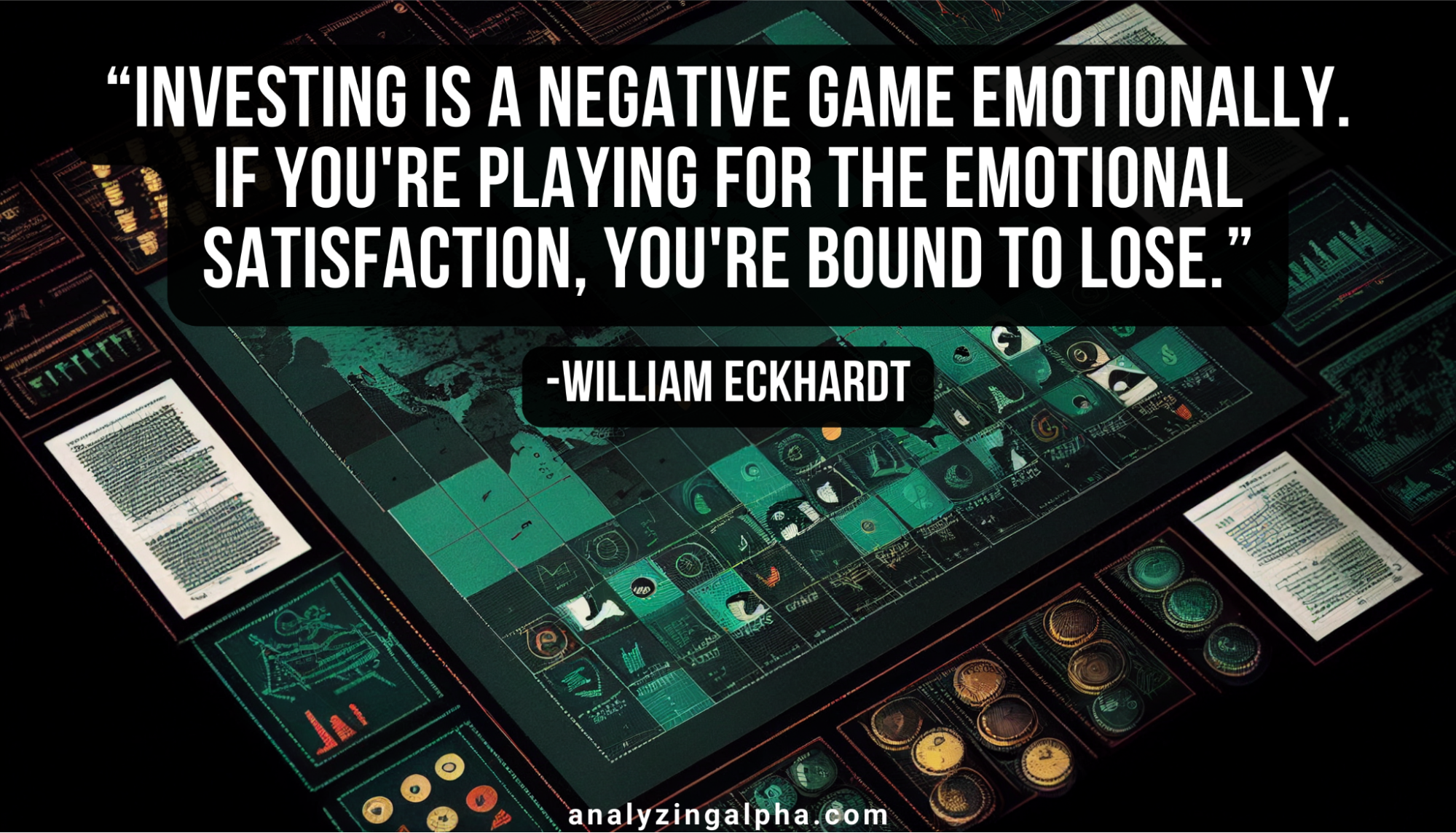
Eckhardt underscores a crucial point: investing should be a game of reason, not emotion. Letting your feelings run wild can lead to reckless decisions, setting you up for a financial tumble. And searching for emotional satisfaction in your investments? That’s a one-way ticket to Risky Town, with a potential pit stop at Loss City.
So, what’s the secret sauce? Keep your emotions on a tight leash. Make your moves based on thoughtful analysis and solid judgment. Eckhardt’s wisdom is a wake-up call to every trader: emotional discipline isn’t just important; it’s the linchpin of your investment strategy.
Conclusion: Why Read William Eckhardt Quotes?
These 19 powerful quotes from William Eckhardt are a goldmine for ambitious traders keen to elevate their game. Each nugget of wisdom showcases Eckhardt’s razor-sharp, data-driven approach that has catapulted him into the millionaire’s club.
He drives home the crucial need to remain tethered to facts, craft intelligent trading systems, and tackle losses with a brave front. If you’re hungry to construct a portfolio that paves your path to millionaire status, Eckhardt’s method is a must-try!